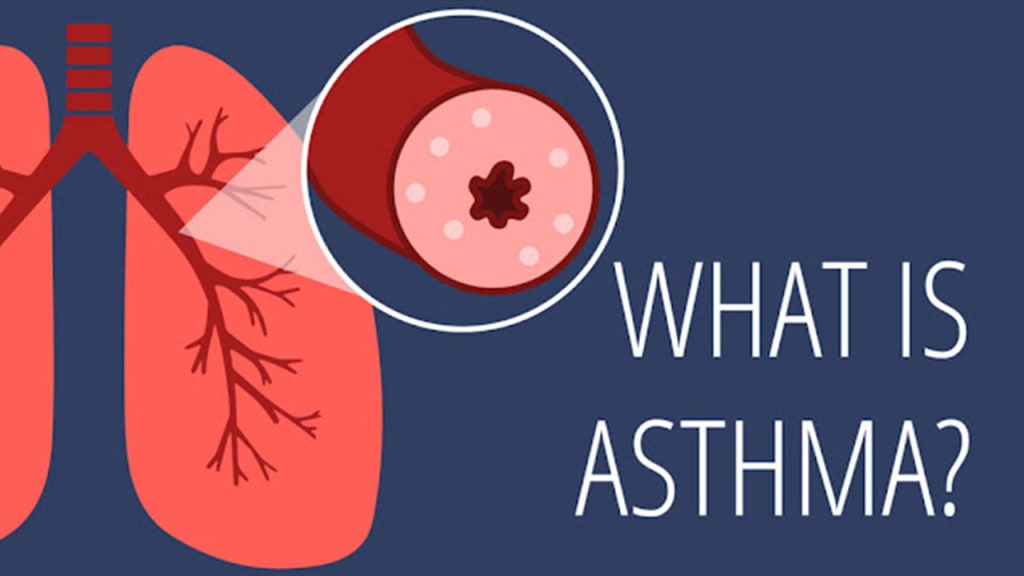Asthma: Understanding the Chronic Respiratory Condition
Asthma: Understanding the Chronic Respiratory Condition

What is asthma?
Asthma is a chronic respiratory condition that affects the airways, the tubes that carry air in and out of the lungs. It is characterized by inflammation and airway narrowing, making it difficult for air to flow freely. This narrowing is caused by a combination of factors, including the tightening of the muscles surrounding the airways, swelling of the airway walls, and increased mucus production.
There are two main types of asthma:
1. Intermittent Asthma: This type of asthma is characterized by occasional symptoms that come and go. People with intermittent asthma may not need to take medication every day.
2. Persistent Asthma: This type of asthma is more severe and requires daily medication. People with persistent asthma may have symptoms that are present all the time, or they may have periods of time when their symptoms are worse.
What Causes Asthma?
The exact cause of asthma is not fully understood, but it is thought to be a combination of genetic and environmental factors. Some of the environmental factors that can trigger asthma attacks include:
Allergens, such as pollen, dust mites, and pet dander
- Cold air
- Exercise
- Strong smells
- Certain medications
- Stress
Symptoms of Asthma : The symptoms of asthma can vary from person to person and can range from mild to severe. Some common symptoms of asthma include:
- Coughing
- Wheezing
- Shortness of breath
- Chest tightness
Asthma Attacks: An asthma attack is a sudden worsening of asthma symptoms. During an attack, the airways become even more inflamed and narrow, making it very difficult to breathe. Asthma attacks can be triggered by a variety of factors, including the ones listed above. They can also be triggered by infections, such as colds or the flu.
Living with Asthma: With proper treatment, most people with asthma can live normal, active lives. However, it is important to be aware of your asthma and to take your medication as prescribed.
- If you have asthma, there are a few things you can do to help yourself stay healthy
- Know your triggers and avoid them as much as possible.
- Take your medication as prescribed.
- Get regular checkups with your doctor.
- Learn how to use your inhaler properly.
- Be prepared for an asthma attack.
Asthma Side Effects : Most people with asthma do not experience any side effects from their medication. However, some individuals may encounter minor side effects, such as shakiness, headaches, a racing heart, or trouble sleeping. If you experience any of these side effects, it is essential to discuss them with your healthcare provider, as adjustments to your treatment plan may be necessary.
Diagnosing Asthma: Diagnosing asthma involves a thorough evaluation by your doctor. While no single test definitively diagnoses asthma, your healthcare provider will likely consider your symptoms, medical history, and family history. Additionally, they may conduct a physical exam and order specific tests, such as a chest X-ray or a spirometry test, to assess lung function.
Asthma and Pregnancy : Asthma does not usually affect pregnancy, but it is crucial for pregnant individuals with asthma to continue managing their condition. Adherence to the prescribed treatment plan during pregnancy is essential to control asthma and prevent asthma attacks. If you have asthma and are pregnant, it's crucial to have open communication with your doctor to ensure that your treatment plan is safe for both you and your baby.
Asthma and Children: Asthma is one of the most common chronic diseases in children, affecting about 1 in 10 children in the United States. Managing asthma in children requires collaboration with their healthcare provider to develop an appropriate treatment plan. Similar to adults, children should avoid triggers, take medications as prescribed, attend regular checkups, and know how to use their inhalers correctly.
Asthma Triggers : Asthma triggers can vary from person to person, and avoiding them is essential for preventing asthma attacks. Some common triggers include:
Allergens: These include pollen, dust mites, pet dander, and mold.
Cold air: Cold air can trigger asthma attacks in some individuals, particularly during the winter months.
Exercise: Physical activity can induce asthma symptoms in some individuals, especially if they do not warm up properly before exercise.
Strong smells: Certain odors, like smoke or strong chemicals, can trigger asthma symptoms in sensitive individuals.
Certain medications: Aspirin, beta-blockers, and some antibiotics may trigger asthma symptoms in some individuals.
Stress: Emotional stress can exacerbate asthma symptoms in susceptible individuals.
Treating Asthma: The primary goal of asthma treatment is to control symptoms and prevent asthma attacks. Your healthcare provider will work with you to develop a personalized treatment plan that may include:
Quick-relief medications: These medications, such as bronchodilators, are used to provide immediate relief during asthma attacks by opening up the airways.
Long-term control medications: These medications, including inhaled corticosteroids, leukotriene modifiers, and long-acting beta-agonists, are used daily to reduce inflammation in the airways and prevent asthma attacks.
Lifestyle changes: Making healthy lifestyle choices, such as avoiding triggers, engaging in regular exercise, getting adequate sleep, and maintaining a balanced diet, can complement medical treatment and improve overall asthma management.
Proper Asthma Treatment : The best way to manage asthma is by collaborating with your healthcare provider to develop a comprehensive treatment plan tailored to your specific needs. This plan should include a combination of quick-relief and long-term control medications to keep asthma under control effectively.
Furthermore, adopting a healthy lifestyle and avoiding triggers can significantly contribute to reducing asthma symptoms and enhancing overall well-being.
If you have any questions or concerns about your asthma, don't hesitate to talk to your healthcare provider. They can provide valuable guidance and support in managing your condition effectively.
Conclusion : In conclusion, asthma is a chronic respiratory condition that affects millions of individuals worldwide. It is characterized by inflammation and narrowing of the airways, leading to breathing difficulties and asthma attacks. While the exact cause of asthma is not fully understood, it is believed to be influenced by both genetic and environmental factors.
Managing asthma requires a personalized approach, as triggers and symptoms can vary from person to person. By working closely with healthcare providers, individuals with asthma can develop effective treatment plans that include quick relief and long-term control medications. Additionally, making lifestyle changes, avoiding triggers, and being prepared for asthma attacks are essential in maintaining control over the condition and leading a healthy, active life.
If you or someone you know is experiencing asthma symptoms or suspects having asthma, seeking medical attention is crucial. Proper diagnosis and management can significantly improve the quality of life for those affected by this respiratory condition.
FAQs (Frequently Asked Questions)
Can asthma be cured?
Asthma is a chronic condition, and while there is no cure, it can be effectively managed with the right treatment plan and lifestyle adjustments.
Can asthma develop later in life?
Yes, asthma can develop at any age, including adulthood. It's essential to recognize the symptoms and seek medical evaluation for proper diagnosis and treatment.
Is asthma hereditary?
While asthma can run in families, it is not entirely determined by genetics. Environmental factors also play a significant role in its development.
Can I exercise if I have asthma?
Yes, individuals with asthma can engage in physical activity. Proper warm-up and following an asthma action plan can help manage exercise-induced symptoms.
What should I do during an asthma attack?
During an asthma attack, use your quick-relief inhaler as prescribed. If symptoms worsen or don't improve, seek emergency medical assistance immediately.
Is it safe to use long-term control medications for asthma?
Yes, long-term control medications prescribed by your healthcare provider are generally safe and effective for managing asthma when used correctly.
Can stress trigger asthma attacks?
Yes, emotional stress can be a trigger for asthma attacks in some individuals. Stress management techniques can help reduce the likelihood of such attacks.
Can I travel with asthma?
Yes, individuals with asthma can travel with proper planning. Ensure you have enough medication, a written asthma action plan, and access to medical care if needed.
Does smoking worsen asthma?
Yes, smoking and exposure to second-hand smoke can worsen asthma symptoms and increase the risk of asthma attacks. Avoid smoking and second-hand smoke.
What should I do if my asthma symptoms worsen?
If your asthma symptoms worsen or you experience frequent asthma attacks, contact your healthcare provider immediately for a review of your treatment plan.
Remember, managing asthma effectively involves open communication with healthcare providers, adherence to prescribed medications, and a proactive approach to identifying and avoiding triggers. With proper management, individuals with asthma can lead fulfilling lives with minimal impact from this chronic condition
About the Creator
Zeeshan Siraj
This is Zeeshan Siraj, a passionate content writer from Pakistan. With over a decade of experience, my creative brilliance knows no bounds that are the only reason I am a new star in the writing industry.
I will wait for your feedback
Thanks.






Comments
There are no comments for this story
Be the first to respond and start the conversation.